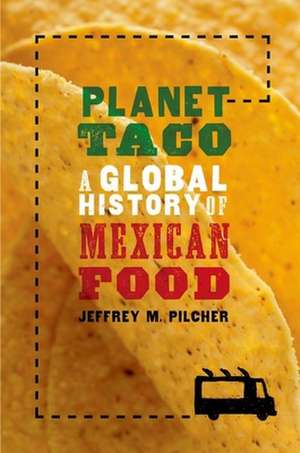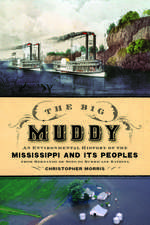Planet Taco: A Global History of Mexican Food
Autor Jeffrey M. Pilcheren Limba Engleză Paperback – 30 mar 2017
| Toate formatele și edițiile | Preț | Express |
|---|---|---|
| Paperback (1) | 131.94 lei 22-36 zile | |
| Oxford University Press – 30 mar 2017 | 131.94 lei 22-36 zile | |
| Hardback (1) | 166.33 lei 40-51 zile | |
| Oxford University Press – 17 oct 2012 | 166.33 lei 40-51 zile |
Preț: 131.94 lei
Nou
Puncte Express: 198
Preț estimativ în valută:
25.25€ • 26.43$ • 21.01£
25.25€ • 26.43$ • 21.01£
Carte disponibilă
Livrare economică 10-24 martie
Preluare comenzi: 021 569.72.76
Specificații
ISBN-13: 9780190655778
ISBN-10: 0190655771
Pagini: 320
Ilustrații: 46 halftones
Dimensiuni: 142 x 226 x 23 mm
Greutate: 0.4 kg
Editura: Oxford University Press
Colecția OUP USA
Locul publicării:New York, United States
ISBN-10: 0190655771
Pagini: 320
Ilustrații: 46 halftones
Dimensiuni: 142 x 226 x 23 mm
Greutate: 0.4 kg
Editura: Oxford University Press
Colecția OUP USA
Locul publicării:New York, United States
Recenzii
Meticulously researched and comprehensive Pilcher's concluding chapter provides a masterful analysis of the elements that shape and impinge upon the quest for food authenticity in general.
Many of Pilcher's anecdotes are entertaining and informative...folks looking to supplement their favorite meal with some food for thought need look no further.
Pilcher's proper emphasis on regional cuisines enables him to rescue the Tex-Mex taco from those elite Mexicans (often based in Mexico City) who reject it as a commercial invention: in fact, Tex-Mex cooking evolved organically in the border region, combining North American ingredients with Mexican sensibilities. Viewing food as a force of history, Pilcher imagines that 'the thin edge of a taco may one day help bring down the militarized border.'
For those willing to sign on for the ride, it's a fascinating gold mine of information -- thoughtfully explained, usefully organized, and thoroughly documented. Eating a taco is eating history, indeed.
This synthesis not only shifts our understanding of Mexican food's global story, but also offers a number of fascinating case studies that lend insight into Mexican food and globalization. The book, though a serious history of Mexican cuisine of interest to specialists, will surely appeal to a general audience as well ... Pinning down an authentic Mexican food, as Pilcher shows, may be an unwinning wrestling match.
As a work designed for a broad audience, the book is accessible, written concisely and at times rather humorously ... As such, the book would be useful in undergraduate classes of all levels, whether in Latin American or world history. At the graduate level, Planet Taco would be helpful in world history seminars that include Mexico among the topics. Beyond the historical argument, which is an expansion of the work Pilcher began many years ago, this book is quite informative and enjoyable to read.
[Pilcher] manages to capture the essence of the demand of this very special food within America's borders. The narrative is lively and convincing, and he manages to include even a few recipes and inspiring photographs that encapsulate the history of something special within US borders. Pilcher's ... ability to tell a good story while showcasing some of the problems with 'Yankee ingenuity transforming Mexican culture' within the US raises both an appreciation for the consumption and understanding of Mexican fare, but also of the nature of globalisation and the long arm of American business.
A browser might take Planet Taco for another 'follow that food' tale ... Yet this book is far more ambitious, tracing the growth, emergence and spread of an entire national cuisine. Jeffrey Pilcher ... uses the lowly taco as an emblem of both the complex origins of Mexican food, and its eventual global expansion ... All of these delicious bits and pieces are held together by a narrative sweep that emphasizes mixture, controversy, constant class struggle, and the global forces of colonialism and capitalism.
Rich, exceptionally well written, and thoroughly researched ... The study's particular strength is the way Pilcher grounds a cultural history of Mexican cuisine in a detailed understanding of shifting immigration policy, changes in industrial technology, Cold War foreign policy and the Green Revolution, and social change in twentieth-century Mexico and the United States.
This book is a pleasure to read ... It will be enjoyed by the lay reader of nonfiction who is interested in food, but has much to offer professional scholars as well. Its trans-disciplinary nature and readability should gain it a broad audience, but this is still a work of serious scholarship. Planet Taco is rich enough to provide fodder for graduate seminars or upper-level undergraduate classes, but has nothing of the textbook about it. It celebrates Mexican cuisine as an exemplar of global food culture today - a complex product of historical contingency, the search for meaning, and economic constraints. The unique history of Mexican food reminds us that these elements shape our lives in profound ways wherever we live - and whether we take our chili red or green.
Many of Pilcher's anecdotes are entertaining and informative...folks looking to supplement their favorite meal with some food for thought need look no further.
Pilcher's proper emphasis on regional cuisines enables him to rescue the Tex-Mex taco from those elite Mexicans (often based in Mexico City) who reject it as a commercial invention: in fact, Tex-Mex cooking evolved organically in the border region, combining North American ingredients with Mexican sensibilities. Viewing food as a force of history, Pilcher imagines that 'the thin edge of a taco may one day help bring down the militarized border.'
For those willing to sign on for the ride, it's a fascinating gold mine of information -- thoughtfully explained, usefully organized, and thoroughly documented. Eating a taco is eating history, indeed.
This synthesis not only shifts our understanding of Mexican food's global story, but also offers a number of fascinating case studies that lend insight into Mexican food and globalization. The book, though a serious history of Mexican cuisine of interest to specialists, will surely appeal to a general audience as well ... Pinning down an authentic Mexican food, as Pilcher shows, may be an unwinning wrestling match.
As a work designed for a broad audience, the book is accessible, written concisely and at times rather humorously ... As such, the book would be useful in undergraduate classes of all levels, whether in Latin American or world history. At the graduate level, Planet Taco would be helpful in world history seminars that include Mexico among the topics. Beyond the historical argument, which is an expansion of the work Pilcher began many years ago, this book is quite informative and enjoyable to read.
[Pilcher] manages to capture the essence of the demand of this very special food within America's borders. The narrative is lively and convincing, and he manages to include even a few recipes and inspiring photographs that encapsulate the history of something special within US borders. Pilcher's ... ability to tell a good story while showcasing some of the problems with 'Yankee ingenuity transforming Mexican culture' within the US raises both an appreciation for the consumption and understanding of Mexican fare, but also of the nature of globalisation and the long arm of American business.
A browser might take Planet Taco for another 'follow that food' tale ... Yet this book is far more ambitious, tracing the growth, emergence and spread of an entire national cuisine. Jeffrey Pilcher ... uses the lowly taco as an emblem of both the complex origins of Mexican food, and its eventual global expansion ... All of these delicious bits and pieces are held together by a narrative sweep that emphasizes mixture, controversy, constant class struggle, and the global forces of colonialism and capitalism.
Rich, exceptionally well written, and thoroughly researched ... The study's particular strength is the way Pilcher grounds a cultural history of Mexican cuisine in a detailed understanding of shifting immigration policy, changes in industrial technology, Cold War foreign policy and the Green Revolution, and social change in twentieth-century Mexico and the United States.
This book is a pleasure to read ... It will be enjoyed by the lay reader of nonfiction who is interested in food, but has much to offer professional scholars as well. Its trans-disciplinary nature and readability should gain it a broad audience, but this is still a work of serious scholarship. Planet Taco is rich enough to provide fodder for graduate seminars or upper-level undergraduate classes, but has nothing of the textbook about it. It celebrates Mexican cuisine as an exemplar of global food culture today - a complex product of historical contingency, the search for meaning, and economic constraints. The unique history of Mexican food reminds us that these elements shape our lives in profound ways wherever we live - and whether we take our chili red or green.
Notă biografică
Jeffrey M. Pilcher is Professor of History at the University of Toronto Scarborough. He is the author of Que vivan los tamales!: Food and the Making of Mexican Identity; The Sausage Rebellion: Public Health, Private Enterprise, and Meat in Mexico City; and Food in World History. He also edited the Oxford Handbook of Food History.










